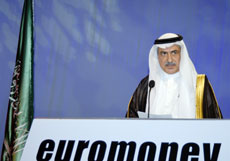RIYADH, 9 May 2007 — Saudi Arabia plans to balance higher government spending with the need to control rising inflation in the Kingdom, Finance Minister Ibrahim Al-Assaf said here yesterday.
“Keeping prices steady is one challenge for financial and monetary polices,” he said at the Euromoney Saudi Arabia Conference 2007, which kicked off yesterday. Al-Assaf said the government plans its spending so it would not harm overall economic growth.
“Programming the spending doesn’t mean to reduce it. It usually means programming investment expenditure. But we will monitor the pressure areas where we can slowdown spending,” he added.
Governor of Saudi Arabian Monetary Agency (SAMA) Hamad Al-Sayari said that inflation in the Kingdom was now under control at 3 percent compared with inflation levels in other parts of the world. “The initial indicator we have is that inflation is stabilizing,” he said.
The governor’s remarks meant that the government has been able to reduce the inflation rate in Saudi Arabia from a previous 4.3 percent last December, as reported by Samba Financial Group in March.
According to the report, annual consumer inflation climbed to 2.9 percent in December 2006, up from 1.2 percent in December 2005 and 0.6 percent at the end of 2004, lifting the average for the year to 2.3 percent, the highest since 1995.
The report said inflation was concentrated in three main areas: Growing poor domestic conditions, higher charges for some imported products increased food prices and high gold prices which lifted the cost of jewelry as well as the rising costs of rent.
Al-Sayari mentioned that future mega-projects in Saudi Arabia as well as the economic boom required additional finance from financial institutions.
“Preliminary figures for financial requirements for the projects mentioned could be more than $500 billion in the next 10 years,” he said.
He also noted that the large figure meant that financial institutions would change many of its mechanisms to provide financial support.
“First of all, these projects require a long-term finance which is not applicable to the old loan system by financial institutions. Second, the financial loan will require a mixture of ownership and guarantees. Third, the financial loans could be provided in several currencies, which means that it could attract establishments and investors from various nationalities. And last, financial loans could be provided in several shapes of commodities which are not yet known in the Saudi market.”
Al-Sayari expected that the Saudi financial system would continue to grow and develop in the next coming years, noting that the Kingdom’s economic growth was the best in decades. He added that several international banks have now become interested in the Kingdom’s future projects and were reacting positively with Saudi businessmen.
“The national economy has grown extensively in the past four years,” he said. “The per capita income per person has increased by 15 percent annually during that period.”
The governor expected that economic growth would continue this year and in years to come by following the economic reforms launched by Custodian of the Two Holy Mosques King Abdullah.


